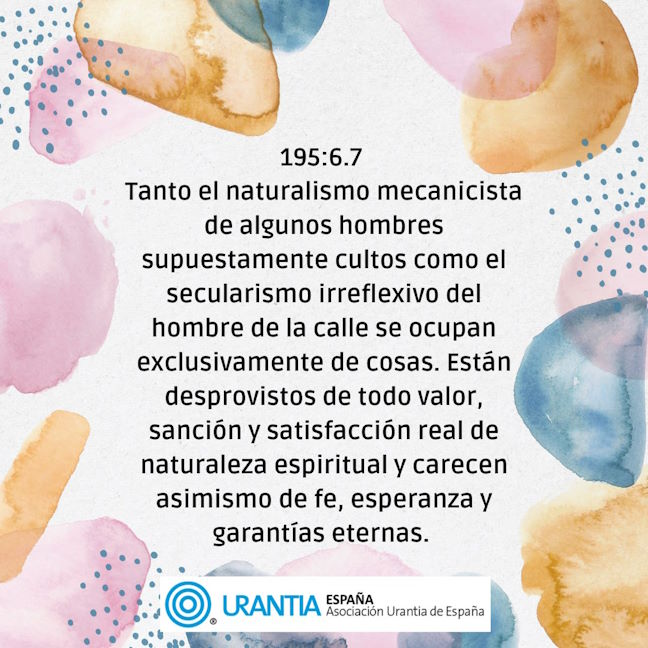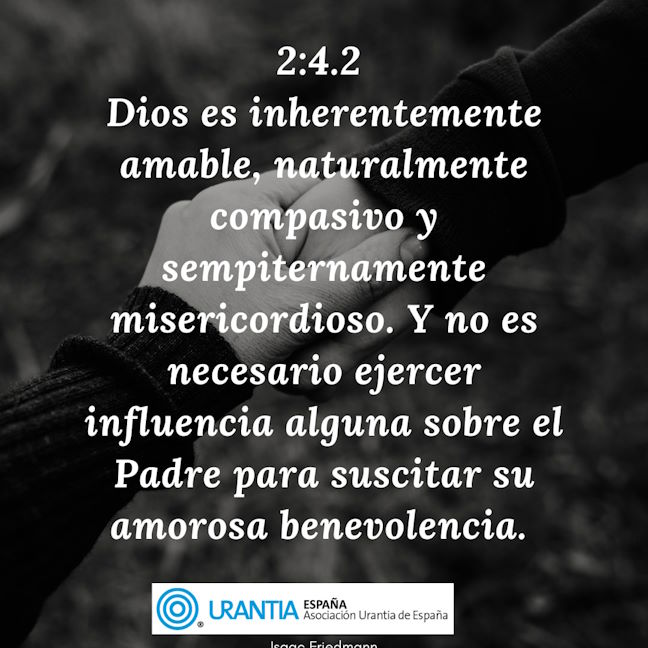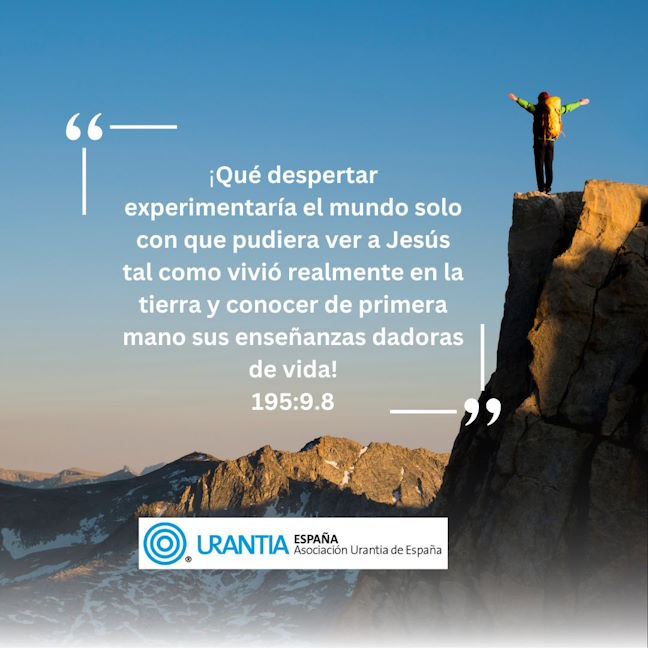© 2024 M. José Sánchez
© 2024 Urantia Association of Spain
¶ Master of happiness

When we read our beloved Urantia Book, we may be tempted to treat the book with solemnity, seriousness and a certain grandiloquence, allowing ourselves to be carried away by the atavism of handling sacred books and organized religions. But, far from that, the book encourages us to contemplate the world with joy and optimism, to judge human beings with understanding and to take events from a cosmic perspective, offering hope to all those who have grown tired of hearing that life is rubbish and our species is an error of evolution that should disappear from the face of the Earth.
Etty Hillesum is not as famous as Anne Frank, perhaps because dying at twenty-nine seems less dramatic than dying at fifteen, but the truth is that both of them burned in the crematoriums of concentration camps in Nazi Germany. Both left us moving diaries that recounted their hardships and showed the resistance of the human spirit to sink into despair, hatred and resentment, even when facing the possibility of a violent and early death. They have left us a great lesson of life and hope.
Anne Frank never lost her ability to take joy in the small field of vision she could observe from her hiding place:
“This morning, when I was looking out the window, looking really deeply and steadily at God and nature, I felt happy, truly happy… As long as one continues to have that inner happiness, that happiness for nature, for health and for so many other things; as long as one carries that with one, one will always be happy again.”
Anne Frank advocated values such as courage, love of nature, caring for others and trust in God. In today’s world, less tragic than hers, these values arouse skepticism. Almost no one dares to praise courage, faith and sacrifice. Even governments try to fight against environmental deterioration, but this ecological awareness is not usually accompanied by the poetic gaze that we see in Anne. In our time, fluid and cynical, we no longer believe in the well-known and old triad formed by truth, beauty and goodness.

Both the mechanistic naturalism of some supposedly cultured men and the thoughtless secularism of the man in the street are concerned exclusively with things. They are devoid of all real value, sanction, and satisfaction of a spiritual nature and are likewise devoid of faith, hope, and eternal guarantees. One of the great problems of modern life is that man thinks he is too busy to find time for spiritual meditation and religious devotion. 195:6.7 (2077.3)
Her contemporary, Etty, also trusted in God and was moved by light, silence, the sound of water and the changing colors of the sky. Etty did not take refuge in beautiful dreams. She looked the world in the face and still loved it:
“Life seems beautiful to me and I feel free. The sky stretches wide both within me and above me. I believe in God, and I believe in people and I dare to say it without shame.”
He did not hold God responsible for the calamities of war and Nazi atrocities: “God does not owe us any explanation, but we do owe him one.” He thought that “life is beautiful, valuable and full of meaning.” What’s more, when the time came to leave for Auschwitz, he dreamed of being “the thinking heart of the barracks” and “being able to act as a balm for the wounds.”
The two women surely had an inner density, that is, a spiritual life and a special sensitivity for beauty and sincere things. Their commitment to life from the barbed wire and the mud, their determination not to let themselves be contaminated by hatred or to renounce truth, beauty and goodness reconcile us with the world. Their real, authentic example is as great and hopeful as our Urantia Book. They, like The Urantia Book, encourage us to reconcile ourselves with life; to proclaim like them that, despite the losses and emptiness, the failures and disappointments, the abominations of history and the catastrophes of nature, life is beautiful. It is possible to love life. As the philosopher Rafael Narbona says:
“To deny life, to affirm that it is absurd and inconsequential, to assure that there is only sound and fury, seems to me the greatest failure of human intelligence.”
Our Urantia Book is multifaceted (science, philosophy, ethics, religion, anthropology, etc. appear in it), but our way of reading it, and above all of practicing its teachings, must show that it is a book about hope. It is a book that rebels against the heralds of pessimism, which does not intend to disturb but to comfort and heal our world and ourselves. A book that shows the loving origin of everything:

God is inherently kind, naturally compassionate, and everlastingly merciful. And no influence upon the Father is necessary to elicit his loving benevolence. The creature’s need is all-sufficient to assure the full flow of the Father’s tender mercies and saving grace. 2:4.2 (38.2)
It is not a naive book. The world endures great catastrophes: famines, wars, epidemics. Suffering is not something far away that affects distant countries sunk in poverty. You can come across it, sometimes it is not even necessary to leave our door. In one of those hives where human beings gather there is always dissatisfaction: unwanted loneliness, fear of losing what has been achieved with great effort, lack of understanding between people in the same family, projects that are left halfway, etc.
However, the human being is not a passive object, a creature programmed to respond to problems with automatisms, but a subject with freedom and creativity, capable of reasoning and seeking alternatives.

It is always possible to reinvent yourself. It is always possible to open a window, not to jump into the void, but to let in fresh air and so that our mind, the most perfect machine that has ever existed, can breathe and renew itself, and can devise new strategies.
Jorge Guillén was not wrong when he wrote about the beautiful moments that help us rise:
The world is fine
done. The moment exalts it
the tide, so high,
so high, without swaying.
Let us imagine this scene from the life of Jesus, which occurred a few days before Passover in Jerusalem, in which he died:
Six days before Passover, the night after the Sabbath, all of Bethany and all of Bethphage gathered to celebrate the arrival of Jesus with a public banquet at Simon’s house. This dinner in honor of Jesus and Lazarus was a true challenge to the Sanhedrin. UB 172:1.2
The atmosphere of the banquet was joyful and normal, except that all the apostles were more serious than usual. Jesus was exceptionally happy and had played with the children until the moment of sitting down at the table. UB 172:1.4
Nothing out of the ordinary happened until near the end of the feast, when Mary, the sister of Lazarus, stepped out from the group of female spectators, walked over to the place of honor where Jesus was reclining, and opened a large alabaster jar containing a very rare and expensive ointment. After anointing the Master’s head, she began to pour it on his feet and let down her hair to dry them with it. The fragrance of the perfume permeated the entire house, and everyone present was astonished at what Mary had done (…) Judas Iscariot approached where Andrew was reclining and said: “Why has this ointment not been sold and the money used to feed the poor? You should tell the Master to reprove this waste.” UB 172:1.5

Jesus, knowing what they were thinking and hearing what they were saying, placed his hand on the head of Mary who was kneeling beside him and said with a kind expression: "Leave her alone, all of you. Why do you bother her about this when she has done something good according to her heart? To you who murmur and say that this ointment should have been sold to give the money to the poor, I will say that you will always have the poor with you and you can help them when it seems good to you, but you will not always have me; soon I will go to my Father. This woman has long kept this ointment for my body on the day of my burial, and if it now seems good to her to anoint me in anticipation of my death, that satisfaction will not be denied her. In doing this Mary has given you all a lesson because she manifests her faith in what I have said about my death and ascension to my Father in heaven. UB 172:1.6
This rebuke, which he took as a personal reproof, definitely induced Judas Iscariot to seek revenge for his hurt feelings. Such ideas had often crossed his subconscious, but now he dared to consciously and openly consider these evil thoughts. And his attitude was reinforced by the criticism of many, given that the price of this ointment was equivalent to what a man earned per year (enough to supply bread to five thousand people). UB 172:1.7
This beautiful story shows us many interesting aspects: the kindness, joy and carefree attitude of Jesus in the face of a dangerous and hostile situation; the unwavering love of his friend Mary who prostrates herself at his feet and gives him the exquisite perfume of spikenard; the lowliness of his views, the harsh criticism of a “friend” like the apostle Judas and his desire for revenge, which shows us that he did not know how to give love and consideration to others, despite having been with the Master for so long.
The gospel is, as we see in this brief history, a source of conflict and tension. No one said it was easy, and the truth is that history shows how the good news of Jesus generates incomprehension in some cases, rejection in others, and there are those who, upon feeling these conflicts, respond with anger, contempt, or even violence.
This led Jesus himself to the cross and problems began among his people, who often did not fully understand his proposals.
They were surprised by a supposed “Messiah” who refused to be proclaimed king. They were disconcerted by the fact that he made service the best form of authority. His countrymen were shocked when they saw the enormous freedom of their teacher to deal with all kinds of people, to ignore conventions that seemed ridiculous to him and also to speak openly, even if what he said could upset the interlocutors. The truth is that the gospel is first and foremost good news, but it is also a source of anxiety.
Is there room for a gospel without conflict? Then it is not the gospel of Jesus. It is not about one having to live the gospel in constant battle. It is not about being on the defensive to stop the blows that may come, nor on the attack to impose a single way of seeing things. Rather, when the logic of the gospel is allowed to spread throughout life, it ends up generating new dynamics, and these dynamics imply imbalances and some other disarray. What conflicts are we talking about?
There are conflicts within us because the Master’s teachings unsettle us, transform our outlook, invite us to take steps that are not usually easy. They propose a wonderful horizon, which attracts and fascinates us, but which implies breaking inertia, demanding ourselves… sometimes demanding a lot from ourselves.
There are also interpersonal conflicts. It makes us lucid about our world and what surrounds us. The gospel will invite us to denounce inappropriate, hypocritical attitudes that can occur in everyday matters (not only in matters of global repercussions). The conflict arises when I have to choose between telling the truth or maintaining a complicit silence; when I have to oppose something that I understand is immoral, or I can decide to ignore it or not care.
And here we come to the great conflict: a different form of love.
The most surprising thing about the gospel, and often the source of the greatest personal, interpersonal and social tensions, is that it not only sets out a certain horizon, but Jesus proposes a surprising path to achieve those goals. It is a concrete way of loving, of serving, of forgiving a thousand times. We would all like a better world. The surprising thing about the gospel is the path chosen: a radical love, the only path that will truly change the world, the one that will offer us happiness.
It could be argued that so far it does not seem that love has had much success either. Perhaps because too often faith is reduced to practices, rituals, affirmations, beliefs or doctrines, but it is not taken to that ultimate core which is the ability to love without measure, without demanding anything in return, thinking of what is best for the other, and especially for those who are most hurt. However, without that belief in the transforming power of the love that Jesus had, nothing of what the Master did is understood, or it is understood poorly.
Without love, the desire for freedom can transform into hatred of the oppressor; the desire for fraternity can become a dictatorship of equality; the desire for justice can lead to a desire for revenge; the desire to seek the truth can lead to exclusionary fundamentalism or ideological dictatorship; the capacity for criticism can raise walls of incomprehension and rejection when love does not exist.
And with love? Well, with love things are not easy either, but they have another meaning. In the episode of the dinner in Bethany we observe different ways of showing love, and in Judas and in those who persecuted the Master we see the lack of true love. Out of love you will give people an opportunity again and again, even if there are those who are scandalized. Out of love you abandon certainties to be considered crazy, foolish or imprudent. Out of love you dialogue with others to meet them, not to impose yourself on them. Out of love you dare to tell the truth, even though it is true that it can hurt others and turn against you.

What an awakening the world would experience if it could only see Jesus as He really lived on earth and know firsthand His life-giving teachings! Words describing beautiful things cannot thrill as much as the sight of those things, nor can the words of a creed inspire the souls of men as does the experience of knowing the presence of God. UB 195:9.8
So therein lies the true conflict, the reason for our hope: in the ability to dream of a world in which love is established, in which hope becomes real and in deciding to go from dreaming to landing that dream. In the determination to live, like Anne and Etty, for others and for hope. In the willingness to choose a surprising path, incomprehensible to some (as happened to Judas) and admirable to others: the path of unconditional love, the path of the Master, the path of authentic happiness. That is our challenge: to also become masters of happiness.
¶ References
- Index of the magazine “Luz y Vida” of the Association of Spain
- This article from the magazine “Luz y Vida Online”